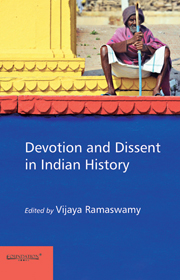Book contents
- Frontmatter
- Dedication
- Contents
- List of Tables and Figures
- Foreword
- Preface
- Introduction: Locating Devotion in Dissent and Dissent in Devotion A Thematic Overview
- Introduction
- 1 Parsing of Devotion and Dissent
- 2 Dissent and Protest in Early Indian Buddhism with Special Reference to Devadatta
- 3 Devotion and Dissent in Hunter's Bhakti
- 4 Devotion and Dissent
- 5 Dissent Within
- 6 Women in Love
- 7 Dissenting Voices
- 8 Dissent in Kabir and the Kabir Panth
- 9 Devotion and Dissent of Punjabi Dalit Sant Poets
- 10 Protest and Counter-protest
- 11 Fakirs of Bengal
- 12 Music in Chishti Sufism
- 13 Dissenting the Dominant
- 14 Devotion and Dissent within the Catholic Church in Late Colonial Bengal
- 15 Narratives of Travel, Voices of Dissent and Attacks on the Colonial Church Fabric of the European Missionaries
- 16 Devotion and Dissent in Narayana Guru
- 17 Sree Narayana Guru's Idioms of the Spiritual and the Worldly
- Contributors
- Index
13 - Dissenting the Dominant
from Introduction: Locating Devotion in Dissent and Dissent in Devotion A Thematic Overview
Published online by Cambridge University Press: 05 October 2014
- Frontmatter
- Dedication
- Contents
- List of Tables and Figures
- Foreword
- Preface
- Introduction: Locating Devotion in Dissent and Dissent in Devotion A Thematic Overview
- Introduction
- 1 Parsing of Devotion and Dissent
- 2 Dissent and Protest in Early Indian Buddhism with Special Reference to Devadatta
- 3 Devotion and Dissent in Hunter's Bhakti
- 4 Devotion and Dissent
- 5 Dissent Within
- 6 Women in Love
- 7 Dissenting Voices
- 8 Dissent in Kabir and the Kabir Panth
- 9 Devotion and Dissent of Punjabi Dalit Sant Poets
- 10 Protest and Counter-protest
- 11 Fakirs of Bengal
- 12 Music in Chishti Sufism
- 13 Dissenting the Dominant
- 14 Devotion and Dissent within the Catholic Church in Late Colonial Bengal
- 15 Narratives of Travel, Voices of Dissent and Attacks on the Colonial Church Fabric of the European Missionaries
- 16 Devotion and Dissent in Narayana Guru
- 17 Sree Narayana Guru's Idioms of the Spiritual and the Worldly
- Contributors
- Index
Summary
Popular Sufi shrines and the practice of saint veneration have a significant bearing on the social formation of contemporary Punjab. In the centuries before the British arrived, networks of shrines loosely linked within the Sufi orders spread through much of the province as the descendants and successors (khalifas) of many of the major saints established their own khanqahs (hospices), which in turn developed into new Sufi shrines. Besides these imposing Sufi shrines, there was an emergence of ‘lesser shrines’ dedicated to one or many, major or minor Sufi centres of medieval Punjab. The networks became particularly dense in parts of the Indus Valley; in south-western Punjab, the shrines of the descendants of Syed Jalaluddin Bukhari of Uch dotted the countryside when the British arrived. Though loosely linked, each of these shrines maintained its distinctive identity and apparently played a crucial role in the Islamization of new territory.
To the Muslim rulers, these shrines represented the local outposts of Islam, and to the population at large, they represented sources of power to all in need of superhuman intervention. They were open to people from all religious persuasions. Liebeskind terms this all-inclusive approach as the local face of Islam. There was yet another practice of constructing ‘memorial shrines’, which gradually developed into distinctive centres of cultural practices, often denoting local as well as long-term geographical influences. These memorial shrines existed in the realm of the popular and inspired many folk writers of medieval and modern Punjab, evolving into a distinct form of ‘saint veneration’.
- Type
- Chapter
- Information
- Devotion and Dissent in Indian History , pp. 291 - 320Publisher: Foundation BooksPrint publication year: 2014



